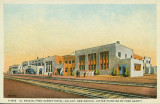At least once a year, I like to return to Chicago for research and inspiration. It’s been tough during the Covid lockdown, but I did head back to my hometown this month in preparation for my next book.
I focused on several spots downtown that I’ve used before in the Duncan Cochrane series. Some of these figure into my next book, which is not part of the series but is set in Chicago and tentatively titled The City Divided by the River. First among these was the Drake Hotel, one of the city’s finest, located right at the elbow of downtown along Lake Shore Drive. From our room, we could see the fireworks over Lake Michigan and easily commute to all the hotspots of the city. Previously, I used it as the setting for the first chapter of They Tell Me You Are Wicked during a fundraiser for Duncan’s campaign.
We also saw the Marina City towers, widely known as the corn cob buildings for their round, notched shape, which are Duncan’s home base in book four of the series, They Tell Me You Are Cunning.
Another stop on our tour was Buckingham Fountain, which figures in my prior books and the climax of my new one. Since I wanted to see it illuminated, we rented bikes and pedaled there to catch it at sunset. It proved true to my memory, not just a tourist trap, but a true landmark of the town.
To read more, subscribe to my newsletter…
Over the last few weeks, I created a video preview for Low Down Dirty Vote II, a fundraiser to halt voter suppression. The short fiction anthology includes my latest story about Duncan Cochrane and his role in trying to get the ERA passed. The book is due for release July 4, but if you’d like a preview, and to see my editing skills, take a look.
All the recent controversy about American Dirt has sparked an ongoing debate about who has the privilege to write about a culture. Does one have to be a member of a particular racial/ethnic/religious group, etc., in order to represent it in words?
I feel strongly not. I’ve read a number of books where all the characters check the same demographic boxes as the author (for example, young, privilege white boys at a private prep school), and they are almost universally dull and myopic. I credit authors who represent people unlike themselves. During my career, I’ve purposely written from the POV of women, African-Americans, gay people, and most recently Native-Americans. That is one of the great challenges in fiction: to take on the perspective of another.
To deny authors that right, even if they come from a privileged group, is to reduce all fiction to thinly veiled auto-biography.
The question should not be whether an author is entitled to depict a particular person but whether they did it well.
As to American Dirt, I haven’t read it yet and can’t comment on its success in that regard, but I respect the effort.
https://www.npr.org/2020/01/24/799164276/american-dirt-author-jeanine-cummins-answers-vocal-critics
All my favorite Christmas traditions in Chicago occurred at Marshall Field’s, the city’s flagship department store on downtown’s State Street. They had the best window decorations, the biggest indoor Christmas tree, and — my favorite — the Frango mints. While the first two customs endure, the last passed away after the store sold out to Macy’s. A sad passing…

This week, I fired AAA as my insurance carrier after they denied me an umbrella policy. They claimed that my side gig as an author made me a bad liability risk. This after checking my website and seeing that I speak a couple times a year about my work. The tone deaf customers service rep I was speaking to had no idea why I’d take offense at such discrimination.
Wait till they hear what I have to say about them now…
Finally found an appropriate reader for the third and fourth books in my Duncan Cochrane series. He’s got a good, deep voice fitting to the genre and doesn’t feel the need to stretch into falsetto for the females. We’re currently scheduled to release Brutal in late March and Cunning in June, both on Audible, but I’ll keep this page updated as we draw close.
Every time I return to Chicago, I have my to do list:

Watch a Cubs game at Wrigley Field
Eat a deep dish pizza
Bike along the lakefront
Read a good book
For my latest stop, I did all four…
Zozzled, splifficated, ossified, hoary eyed, blotto on skee, rotgut, hooch, giggle water, panther piss, bootleg, brown plaid. All can be had at a juice joint, clip joint, barrel house, speakeasy by dewdroppers, lollygaggers, and other jingle brains.
 Which is to say, the 1920s had a bonanza of good slang, mostly related to alcohol. Prohibition not only drove drinkers underground into speakeasies, it also invented a whole new vocabulary for the illegal pleasures.
Which is to say, the 1920s had a bonanza of good slang, mostly related to alcohol. Prohibition not only drove drinkers underground into speakeasies, it also invented a whole new vocabulary for the illegal pleasures.
This provided one of several inspirations for my latest story, “Drinks at the El Navajo,” which appears in the new edition of Alfred Hitchcock’s Mystery Magazine.
To read more, sign up for my newsletter at the bottom of the page…





